Welcome to Sakhi’s curated list of Asian American, Native Hawaiian, and Pacific Islander (AANHPI) literature! As part of our commitment to celebrating diverse voices and cultures, we’ve compiled this selection of books to showcase the rich storytelling contributions of our community. From memoirs to fiction, these works offer insights into the experiences, histories, and identities of the AANHPI diaspora. Whether you’re seeking stories that resonate with your own life or hoping to broaden your understanding of different cultures, we hope this collection will inspire and enrich your reading journey.
Ayesha Manazir Siddiqi is a writer, editor, and translator born in Karachi, Pakistan. Her work has appeared in anthology publications, and her plays have been staged widely. She was a contributing editor for The Trojan Horse Affair, a podcast by The New York Times. The Centre is her debut novel.
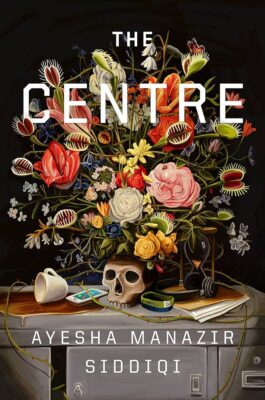
The Centre: A Novel by Ayesha Manazir Siddiqi centers around the lives of various characters in Karachi, Pakistan. It weaves together their stories against the backdrop of political turmoil and societal pressures. The novel doesn’t centrally focus on gender-based violence, but it does touch upon themes of gender inequality and the challenges faced by women in Pakistani society.
Catherine Hernandez is an award-winning author and screenwriter. She is a proud queer woman who is of Filipino, Spanish, Chinese, and Indian descent and married into the Navajo Nation. Her first novel, Scarborough, won the Jim Wong-Chu Award for the unpublished manuscript; was a finalist for the Toronto Book Awards, the Evergreen Forest of Reading Award, the Edmund White Award, and the Trillium Book Award; and was long listed for Canada Reads.

Scarborough is a novel that interweaves the lives of several characters in the multicultural community of Scarborough, a suburb of Toronto, Canada. The novel addresses the intersections of gender, race, and class, illustrating how marginalized women, particularly those of color, are disproportionately affected by violence and systemic oppression. It sheds light on the resilience and strength of these women as they navigate their circumstances and strive to create better lives for themselves and their families.
Gaiutra Bahadur is an American writer, critic, essayist, and journalist. She is the author of Coolie Woman: The Odyssey of Indenture, a personal history of indenture shortlisted in 2014 for the Orwell Prize, the British literary prize for artful political writing. Gaiutra was born in Guyana and emigrated with her family to Jersey City, New Jersey, when she was six years old.
 Coolie Woman: The Odyssey of Indenture is a non-fiction work that delves into the experiences of Indian women who were brought to the Caribbean as indentured laborers during the 19th and early 20th centuries. Through meticulous research and personal narrative, Bahadur explores these women’s lives, shedding light on their struggles, resilience, and contributions to history within the context of colonialism, labor exploitation, and migration. The book examines how the indenture system subjected women to various forms of gender-based violence.
Coolie Woman: The Odyssey of Indenture is a non-fiction work that delves into the experiences of Indian women who were brought to the Caribbean as indentured laborers during the 19th and early 20th centuries. Through meticulous research and personal narrative, Bahadur explores these women’s lives, shedding light on their struggles, resilience, and contributions to history within the context of colonialism, labor exploitation, and migration. The book examines how the indenture system subjected women to various forms of gender-based violence.
Kamila Shamsie was born in 1973 in Karachi, Pakistan, where she grew up. She has a BA in Creative Writing from Hamilton College in Clinton, NY, and an MFA from the University of Massachusetts, Amherst. A reviewer and columnist, primarily for the Guardian, Shamsie has been a judge for several literary awards, including The Orange Award for New Writing and The Guardian First Book Award. She also sits on the advisory board of the Index on Censorship.
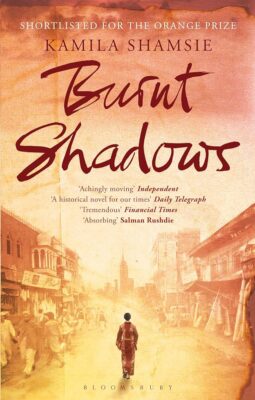
Burnt Shadows is a multi-generational novel that spans decades and continents, exploring themes of love, loss, and the impact of global conflicts on individual lives. The story begins in Nagasaki, Japan, in 1945, where a young woman named Hiroko Tanaka survives the atomic bombing. The novel follows Hiroko’s journey as she moves to India and Pakistan. Gender-based violence is a significant element woven throughout the narrative. The novel portrays how women, like Hiroko, navigate patriarchal societies marked by systemic violence and oppression and explores how global conflicts exacerbate gender-based violence and perpetuate cycles of trauma and suffering.
Prachi Gupta is an award-winning journalist and former senior reporter at Jezebel. She won a Writers Guild Award for her investigative essay Stories About My Brother. Her work was featured in The Best American Magazine Writing 2021 and has appeared in The Atlantic, The Washington Post Magazine, Marie Claire, Salon, Elle, and elsewhere. She lives in New York City.
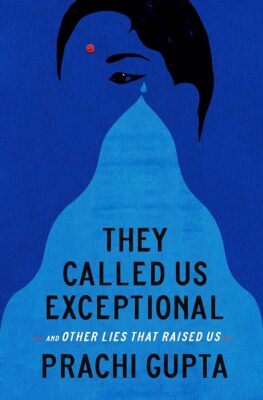 They Called Us Exceptional: And Other Lies That Raised Us is a collection of essays that explores the experiences of South Asian women navigating various aspects of identity, culture, and societal expectations. Through personal anecdotes, reflections, and cultural analysis, the essays delve into the complexities of being a South Asian woman living in the diaspora.
They Called Us Exceptional: And Other Lies That Raised Us is a collection of essays that explores the experiences of South Asian women navigating various aspects of identity, culture, and societal expectations. Through personal anecdotes, reflections, and cultural analysis, the essays delve into the complexities of being a South Asian woman living in the diaspora.
While the collection may not directly address gender-based violence in every essay, it contributes to a broader conversation about gender dynamics and power structures within South Asian communities. Some essays touch upon themes related to gender-based violence, such as the pressures of upholding patriarchal norms, experiences of discrimination and harassment, or the intersection of gender with other forms of oppression.
Yashica Dutt is an Indian writer and independent journalist, has covered various subjects such as fashion, gender, identity, culture, and caste in her work. After the positive reception to her blog post Today, I’m declaring myself Dalit in 2016, Dutt expanded her exploration by creating Documents of Dalit Discrimination on Tumblr. Subsequently, she authored the book Coming Out as Dalit, which was honored with a Sahitya Akademi award.
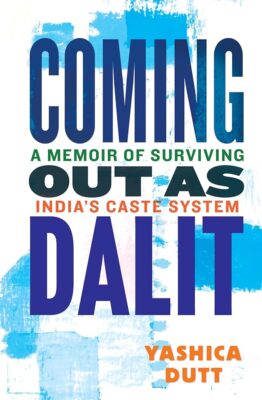 Coming Out as Dalit: A Memoir of Surviving India’s Caste System is a memoir that explores the author’s journey of embracing her Dalit identity in India. Dutt narrates her experiences with grappling caste-based discrimination. She discusses her challenges while navigating her identity in Indian society and the diaspora.
Coming Out as Dalit: A Memoir of Surviving India’s Caste System is a memoir that explores the author’s journey of embracing her Dalit identity in India. Dutt narrates her experiences with grappling caste-based discrimination. She discusses her challenges while navigating her identity in Indian society and the diaspora.
Concerning gender-based violence in the South Asian diaspora, Dutt’s memoir sheds light on how caste discrimination exacerbates the vulnerabilities of Dalit women and the unique forms of oppression they face. Her story underscores the importance of understanding these intersecting identities in addressing gender-based violence within the South Asian diaspora and advocating for social justice and equality.
Jhumpa Lahiri was born in London and raised in South Kingstown, Rhode Island. Brought up in America by a mother who wanted to raise her children to be Indian, she learned about her Bengali heritage from an early age. Lahiri taught creative writing at Boston University and the Rhode Island School of Design. Much of her short fiction concerns the lives of Indian-Americans, particularly Bengalis.
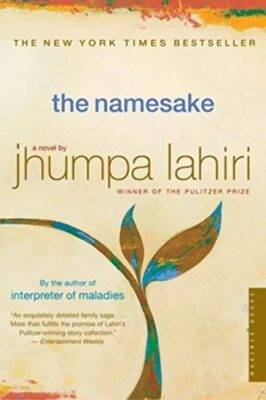 The Namesake follows the new life of Indian immigrants to the United States. The novel explores identity, belonging, family dynamics, the tension between cultural heritage and assimilation. While gender-based violence is not a central theme in the novel, it indirectly addresses the impact of traditional gender roles, and it highlights the constraints and pressures women and men face and expectations within immigrant families.
The Namesake follows the new life of Indian immigrants to the United States. The novel explores identity, belonging, family dynamics, the tension between cultural heritage and assimilation. While gender-based violence is not a central theme in the novel, it indirectly addresses the impact of traditional gender roles, and it highlights the constraints and pressures women and men face and expectations within immigrant families.